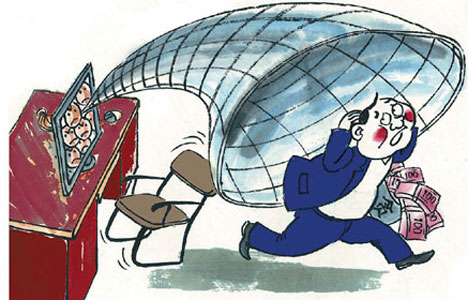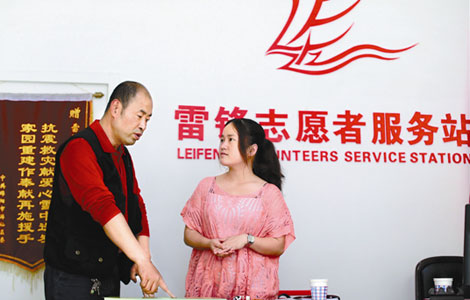Japan out to rival US
Updated: 2013-05-16 07:57
By Wang Yusheng (China Daily)
|
|||||||||||
Soon after US President Barack Obama was sworn in for a second term, Washington organized several high-level visits by officials to East Asia, including China, Japan and the Republic of Korea. Among the US officials who visited the region recently are Secretary of Treasury Jacob Lew, Secretary of State John Kerry, Chairman of the Joint Chiefs of Staff General Martin Dempsey, and Secretary of Defense Chuck Hagel.
The US hopes to maintain its dominant position in the Asia-Pacific region by consolidating its military alliance with the Republic of Korea and strengthening Japan's position in territorial disputes with China.
Washington has sent some positive messages for China, though. Kerry has said that the US and the rest of the world have benefited from a stable and prosperous China. During his recent visit to Beijing, Kerry called for a "special relationship" with China and said: "China is a great power with a great ability to affect events in the world. And we need to work together to do that".
Behind the rhetoric, however, is the "Pacific Dream" of the US, as described by Kerry during a speech in Tokyo recently. The dream is reflected in the Barack Obama administration's policy toward Asia-Pacific, which is aimed at maintaining Washington's dominance in security and economic matters in the region.
For US neo-conservatives, establishing a "special relationship" with China is beyond imagination. They believe that the US can have a "special relationship" only with the United Kingdom and Israel. When even Japan does not qualify for such a relationship, how can China? In fact, the neo-conservatives think that the rise of China, which is likely to surpass the US as an economic power in a few years, is an inconceivable nightmare.
For China, the so-called special relationship proposed by the US can be interpreted as building a "new type of great power relationship". In fact, China's dream of rejuvenating the Chinese nation is not contrary to the "Pacific Dream" of the US.
A growing number of people in the US, including some prominent scholars and experts, have realized that China has no intention of forcing the US out of East Asia or the West Pacific. They have also realized that China will never pursue hegemony.
China pursues a peaceful and friendly "Pacific Dream" based on the principles of equality, mutual trust, mutual respect and mutual benefit. Beijing does not want a new "Cold War" in the Asia-Pacific or any other region. But the Obama administration, especially the neo-conservatives within it, are pushing for deeper alliance with Japan and thus worsening the situation in the Asia-Pacific. The US is even exhorting Japan to play a bigger role in Washington's strategic pivot toward Asia in order to contain China.
Japan, too, has its dream, the dream of military revivalism, as media reports in the West have already pointed out. It's not difficult to understand Japanese right-wing groups' strategy. On the surface, Japan seems to be helping the US counterbalance China and maintain its primacy in the region. But in reality, it will take advantage of the US to whitewash its wartime atrocities, shake off its alliance with the Americans and revise its pacifist constitution to rebuild its war arsenal.
Japan cannot accept the fact that China has relegated it to the world's third-largest economy. Besides, Japan has never been happy following the US. It seems that it has now set its eyes on seizing the dominant position in the Asia-Pacific from the US.
But such an ambition will remain a "daydream" for Japan's right-wing forces, because it goes against the trend of the times. Asian countries, along with the Japanese public, will never allow that to happen. Also, Tokyo will not violate the salient principles of the US-Japan alliance that easily. Moreover, given the bitter lessons of the Japanese attack on Pearl Harbour, the Americans will not allow Japan to hold other countries to ransom again.
But the fact is that Japanese militarism has not been uprooted even more than 60 years after World War II. And there are signs that it is rearing its head again.
If the US neo-conservatives do not stop fueling Japan's ambitions to suit their antediluvian Cold War policies, it will be too late for them to do anything once Japanese right-wingers open "Pandora's box" of militarism.
The author is executive director of the Strategy Study Center, China Foundation for International Studies, and China's former senior official to APEC.
Related readings:
Kerry arrives in Beijing for China visit
Kerry: talks possible if DPRK works for peace
Kerry in Seoul to discuss tensions
Japan, US top diplomats hold talks on ties
Japan, US begin talks on revising defense guidelines
Today's Top News
Taiwan-Philippines dispute grows
British visa easier to woo Chinese tour groups
Solar-grade polysilicon probes almost completed
China to increase input on the Arctic
Visa-free policy in Shanghai draws 3,800 visitors
JP Morgan cuts GDP growth forecast
China to tighten management of teachers
Telephone threats ground five planes
Hot Topics
Lunar probe , China growth forecasts, Emission rules get tougher, China seen through 'colored lens', International board,
Editor's Picks

|

|

|

|

|

|





